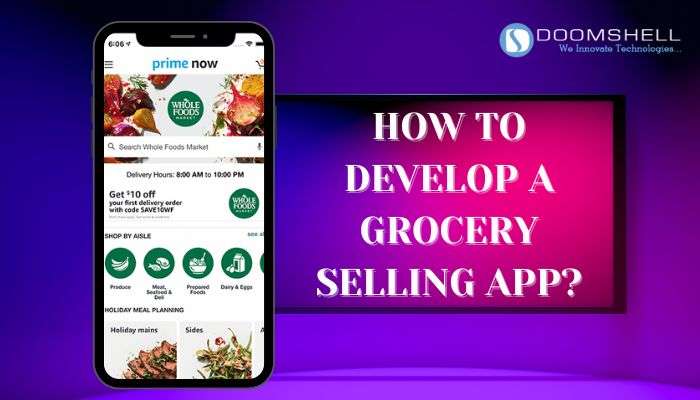Introduction of On-Demand App Development
On-demand app development relates to the design of mobile or web apps that give users quick access to products and services whenever they need them. These apps connect service providers with users by providing real-time services in areas such as food delivery, transportation, healthcare, grocery delivery, home services, and more.
The main aim of on-demand apps is to improve the convenience of customers and enhance efficiency and user experience. They utilize technologies such as GPS tracking, payment gateways, push notifications, and cloud-based databases to instantly connect users to providers. As smartphones and digital services became commonplace, on-demand apps transformed traditional business models, allowing businesses to access a larger audience, enhance operational efficiency, and quickly scale responses to evolving market demand.
Market Analysis of Global On-Demand App Development
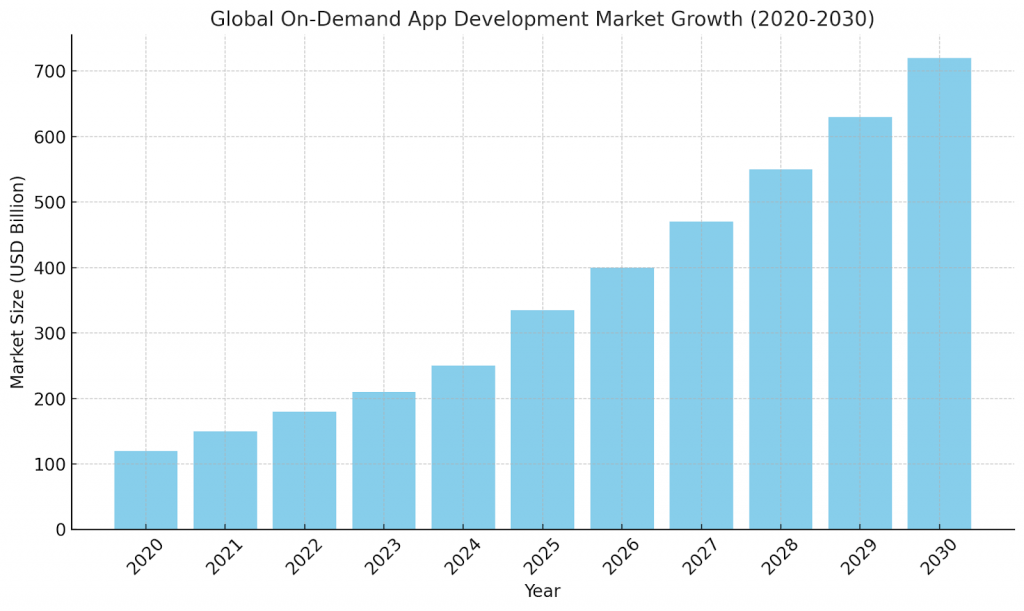
- The worldwide market for on-demand app services is projected to increase to USD 335 billion by 2025, with the growth being driven by the insatiable consumer demand for instant access to services and products.
- The on-demand app services market has a projected CAGR of nearly 24.9%, which signals a great deal of adoption of mobile first, convenience-based applications.
- The improvements in efficacies and accessibility via globalization of on-demand applications can be attributed to technological developments such as AI, 5G, IoT applications, and the growth of the gig economy.
- North America ranks highest in the global on-demand app services market because of notable investments being made to develop AI-driven applications, while the Asia Pacific region, especially India, has been slowly rising in the on-demand platform space that utilizes urban service-based applications.
- Ultimately, the on-demand app services market has a bright future due to ongoing developments including generative AI, Blockchain applications, and voice-enabled interfaces, raising prospects for investments by individuals and startups
Key Takeaway
- With on-demand apps, users can utilize products and services either immediately or at the point scheduled, thus improving user convenience and flexibility.
- Companies can build their presence, improve customer experience, and receive real-time feedback on service improvements.
- On-demand apps are cost-effective, scalable, and secure when compared to traditional approaches to doing business.
- With the increasing demand for speed and convenience, it is clear that on-demand apps offer a future-ready approach for companies.
Types of On-Demand App
1. Apps for Services on Demand: Service-based on-demand applications exist in order to link users and service providers, providing instant services that save both parties time and effort. Services offered by service-based on-demand applications run the gamut from transportation to food delivery to healthcare, beauty and handyman services. By using a service-based on-demand app, users have the ability to book a ride, order a meal, schedule a telemedicine consultation, and obtain various home services ranging from home repairs to beauty treatments. Services on-demand like Uber and OLA provide ride services, apps like Swiggy, Zomato, and Zepto provide meal delivery service, TaskRabbit provides handyman services, and an endless variety of apps provide healthcare and beauty services with professionals treating users at home just like a salon would.
2. Apps for Products on Demand: Product-based on-demand applications are used primarily to have physical goods delivered directly to the users doorstep typically within a few hours of placing the order. Product-based on-demand applications are heavily used for common daily essentials such as groceries, fruits and vegetables, bakery items, and sometimes flowers. The purpose of product-based on-demand apps are to provide convenience and time savings to busy users who often prefer grocery shopping online rather than in stores. Popular examples of product-based apps would be Instacart and Instamart available for grocery delivery and Bloom & Wild for delivery of fresh flowers.
3. Rental-Based, On-Demand Apps: Rental-based, on-demand apps give you the capacity to rent a variety of items for a specified period of time. They offer an affordable and convenient alternative to buying expensive items. These items can cross multiple use cases like vehicles, equipment, or lodging. To rent a car, a bike, a tool, or even an expensive luxury item, all you need to do is find an on-demand rental service. Popular examples of rental-based on-demand apps are Airbnb for short-term stays, Turo for renting cars, and Zilok for renting camping or outdoor recreation gear.
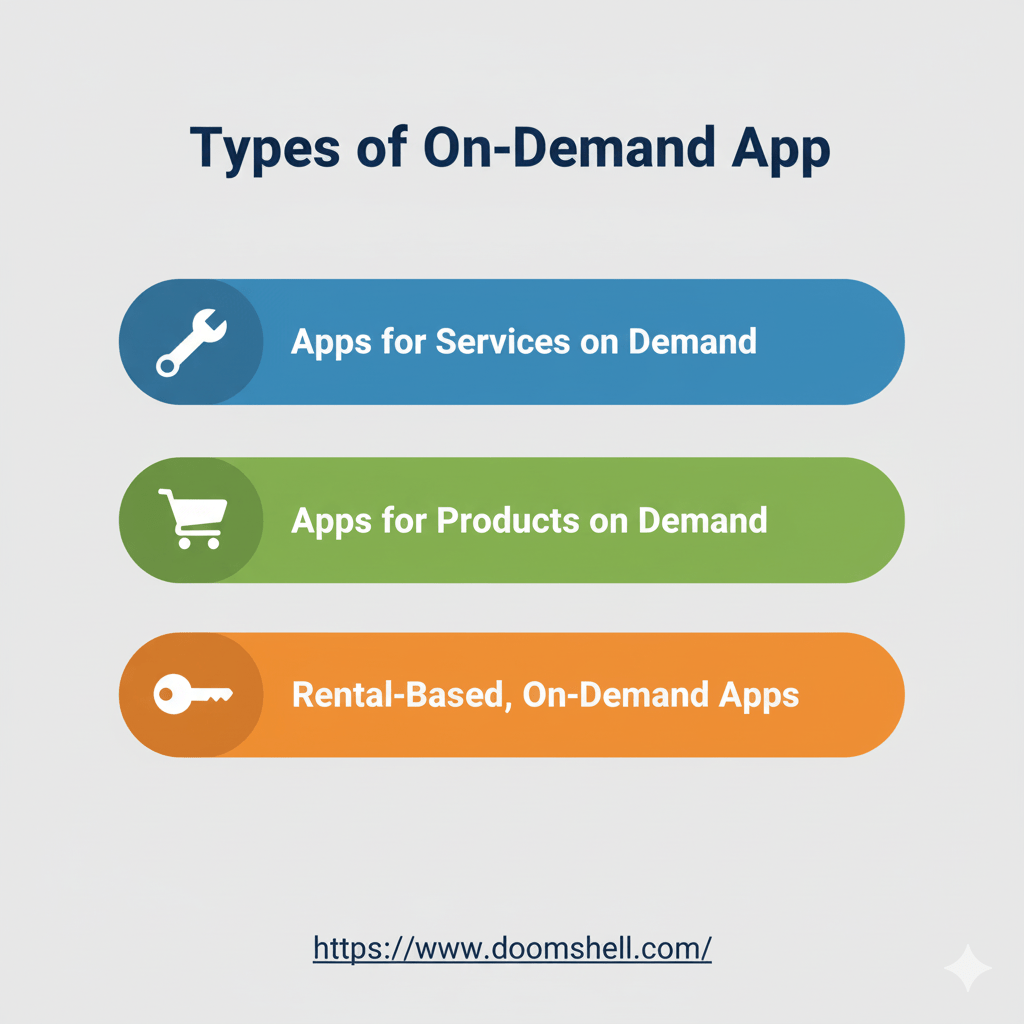
Features of On-demand App
1. User-Friendly Interface: On-demand apps are built to have an easy and user-friendly interface so users can intuitively search, order, or book the desired service or product with little hassle. Smooth use of the app enhances the user experience, which can minimize drop-offs.
2. Real-Time Tracking: These apps use GPS and tracking capabilities to allow the user to monitor the real-time status and location of the service being requested, which can instill trust and transparency.
3. Instant Notifications and Alerts: Push notifications and alerts provide timely communication in informing the user of order confirmations, service updates, discount information, or any other related information.
4. Secure Payment Integration: On-demand apps normally provide multiple payment options (e.g., digital wallets, credit/debit cards, and UPI) with secure encryption and security measures to ensure safe, seamless transactions.
5. Ratings and Reviews: Users can rate and review service providers/products, which helps ensure quality standards while also providing information to other users to help guide their decisions.
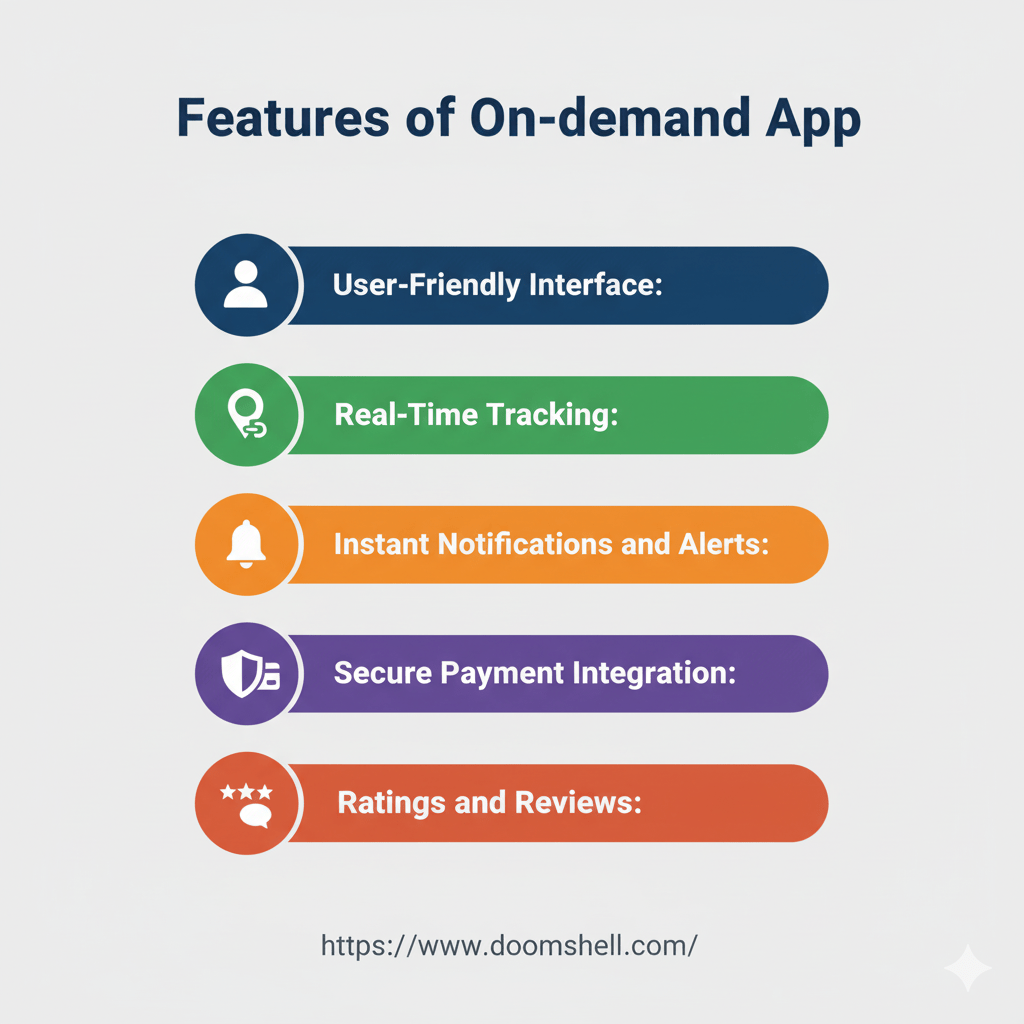
Conclusion
On-demand applications have changed how people receive services and products, offering speed, convenience, and efficiency for consumers in our fast-paced world. On-demand apps create efficiency by connecting service providers or products directly to users and saving them time which improves customer experience and leads to more business opportunities. With the abundance of real-time updates, payment experiences, and an easy user interface involved, on-demand apps now affect industries such as transportation, food delivery, healthcare, and rentals. On-demand app development will be a smart investment for a business to compete with and adapt to changing consumer demands. Connect with the doomshell for further inquiries.
Also Read
How to Develop a School ERP Solution
Important FAQs
An on-demand app is a mobile or web app that allows users toaccess goods or services instantly, connecting users with suppliers in real-time.
The main types are service-based apps (rides, food delivery, home services), product-based apps (groceries, flowers, daily essentials), and rental-based apps (cars, equipment, lodging).
Some key features are an easy-to-use user interface, real-time tracking, instant notifications, secure payments, ratings and review systems, booking/scheduling options, and admin dashboards.
On-demand apps enhance the convenience of the customer experience, improve efficiency in operations, allow for reach into new and expanding customer markets and ecosystems, and provide businesses with a competitive edge in fast-changing industries.
Industries that benefit the most from on-demand apps include transportation, food delivery, healthcare, beauty and wellness, retail, logistics, and rentals.









 sales@doomshell.com
sales@doomshell.com
 +91 8005523567
+91 8005523567
